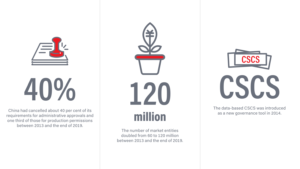
Re-conceptualising China’s Corporate Social Credit System and why foreign companies need to learn to coexist with it
Despite being intensely debated in both China and internationally, China’s Corporate Social Credit System (CSCS) is here to stay. In fact, in late 2020, the State Council clarified that the implementation of the CSCS will be reinforced – together with various ongoing governance reforms, including Internet+ supervision. Hailin Wang of Sinolytics believes that this is not necessarily bad news for foreign companies: a fresh look at the CSCS helps to re-conceptualise its design and sheds light on why foreign companies should learn to co-exist with and benefit from the system.
China’s economic reform started in 1978 with the gradual dismantling of the planned economy, which had heavily interfered in the allocation of market resources. The ensuing reforms, however, did not alter the primary role of administrative approvals in China’s approach to market governance.
It was only in 2013 that China began a new set of ambitious regulatory reforms aimed at streamlining market governance, delegating power, improving governmental services and, by doing so, ultimately also improving China’s business environment. Within the space of six years, these reforms achieved a remarkable reduction in administrative burdens: according to State Council data, China had cancelled about 40 per cent of its requirements for administrative approvals and one third of those for production permissions by the end of 2019.
As part of these reforms and to deal with the rapidly growing number of market entities—which doubled from 60 to 120 million in those six years—the data-based CSCS was introduced as a new governance tool in 2014.

The CSCS makes adjustments along the entire ‘regulatory life cycle’
China’s previous supervision paradigm focussed on ex ante supervision. This means the government maintains ‘good market order’ by deciding beforehand if an entity is qualified to conduct certain business activities. With the new CSCS-based market governance, ex ante supervision is substantially reduced. Entities can substitute certain filing documents with social credit-based ‘promise letters’ when applying for administrative approvals. Meanwhile, however, both interim and ex post—based on actual results—supervision are being strengthened.
Interim supervision relies on distinguishing between trustworthy and distrusted entities, and attaching varying levels of supervision and regulatory resources. To allow this distinction, China has been building an immense public credit database, which contains credit information about all entities in the Chinese market and is used to compute scale ratings and the comprehensive social credit score (‘one score’). The customs rating is the scale rating most people are familiar with: a ‘distrusted customs’ entity (the worst rating result for customs) is burdened with invasively frequent examinations (with an examination rate of 84.76 per cent) from the Customs Authority, while the examination rate for advanced authorised economic operators (the best rating result) is reduced to only 0.57 per cent. For the comprehensive one score, an entity receives a single score based on its ‘performance’ across all applicable regulatory areas, with Zhejiang Province leading in implementation.
Second, for ex post supervision, the CSCS has created a new type of penalty: joint sanctions. Most ministries have set up corresponding blacklisting standards in their area of responsibility. Certain non-compliant behaviours in one administrative field, if reaching the severity of the pre-defined blacklisting threshold, trigger joint sanctions by a large number of ‘peer ministries’. For example, non-compliance with taxation laws and regulations can lead to sanctions not only from the tax authority, but also from the Ministry of Finance, Customs, the National Development and Reform Commission (NDRC), among others, based on ‘co-enforcement’ Memorandum of Understandings (MoU) signed by 37 ministries.

CSCS implementation criticised by the NDRC – adjustments ongoing
Although China’s CSCS is not fully operational yet, disputes within Chinese policy circles about the exact scope of collected public credit information as well as the legitimacy of joint sanctions are growing. Joint sanctions, which are regarded as quasi-administrative penalties, are only based on the mentioned MoUs, though these are not seen as of sufficient legal basis. Further, the NDRC has called out local governments for abusing the SCS through local-specific blacklists, with standards and joint sanctions not adequately based on laws, regulations or orders from the State Council.
Given these ongoing regulatory recalibrations and announcements, it can be expected that the CSCS will be shaped towards more legitimacy and transparency, and will be further homogenised and standardised as a regulatory tool. Besides, Chinese policymakers see the CSCS as a key element of the broader regulatory reforms launched in 2013 and appreciate its ‘entity-tailored’ ability to alleviate administrative burdens and provide benefits for (the most) compliant market participants. Against the backdrop of the CSCS’ solidifying function within China’s emerging new market governance system, foreign companies will need to learn to co-exist with and actively benefit from the CSCS.
—————————
Hailin Wang is an experienced consultant with Sinolytics focussing on industrial policy, and novel regulatory concepts and specific regulations. Sinolytics is a European research-based consultancy entirely focussed on China with offices in Berlin, Zurich and Beijing. The European Chamber collaborated with Sinolytics to produce a report on the CSCS, The Digital Hand: How China’s Corporate Social Credit System Conditions Market Actors, which can be downloaded here: How China’s Corporate Social Credit System Conditions Market Actors (europeanchamber.com.cn)


Recent Comments